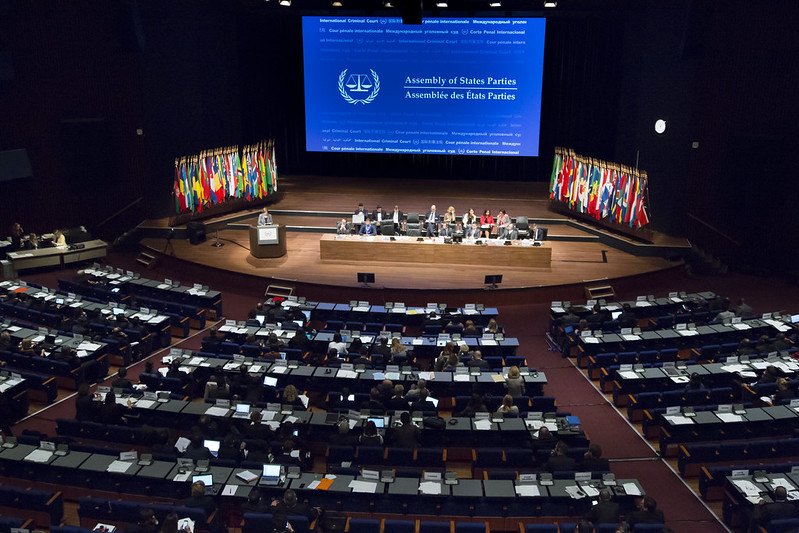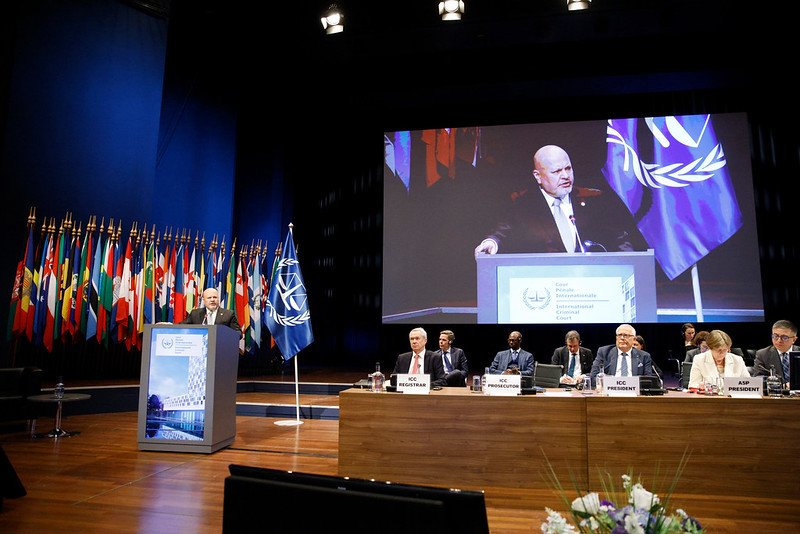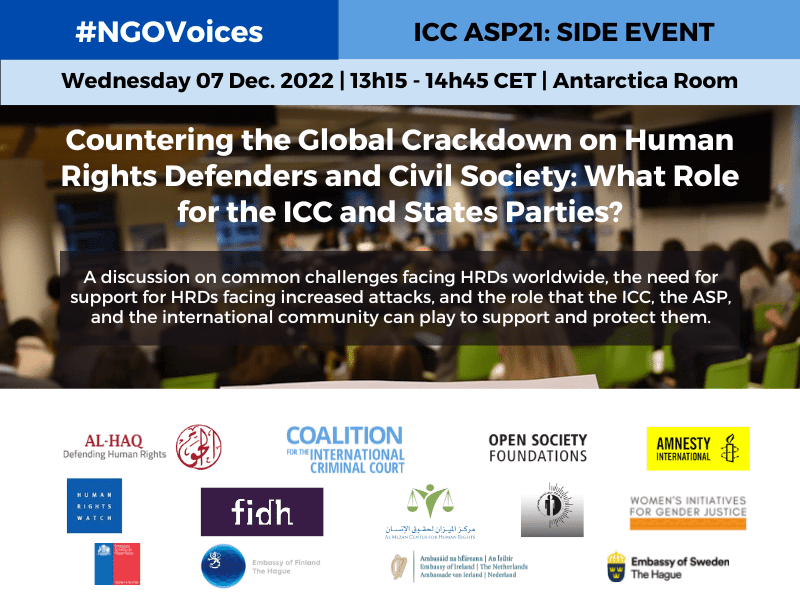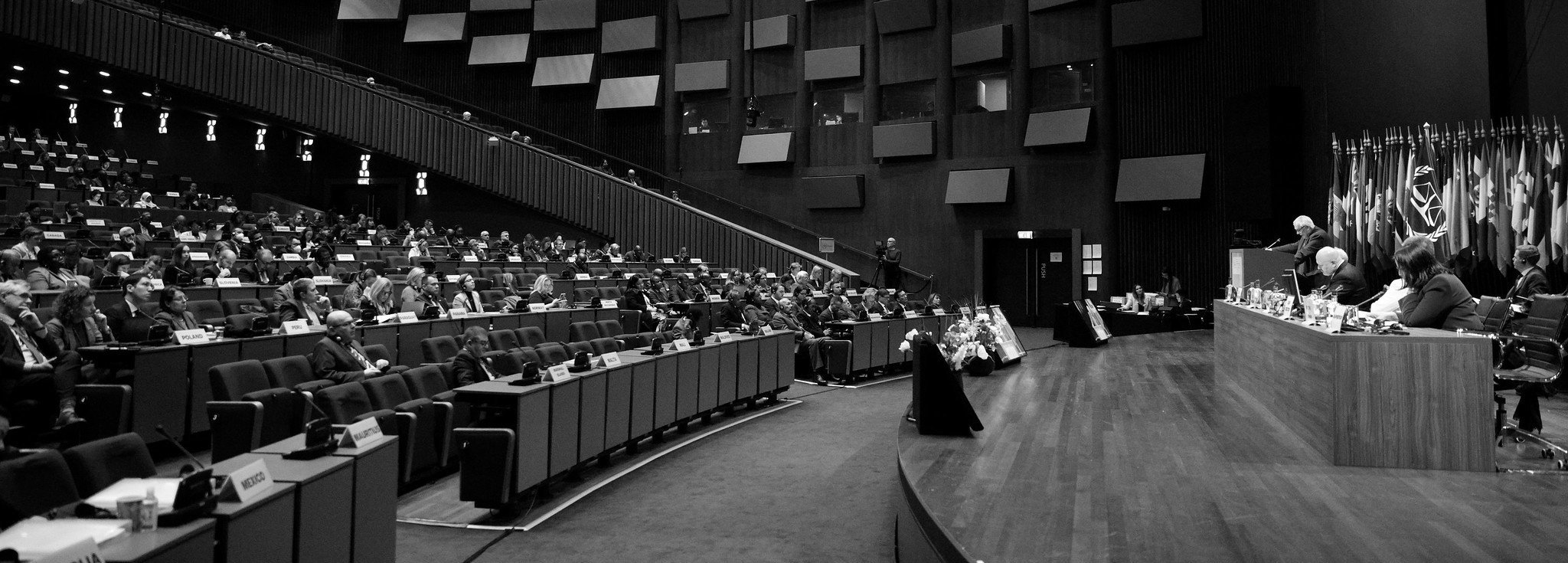Between 5 and 10 December 2022, the Just Access Representative to the Coalition for the International Criminal Court, Zinovia Verikokidi, had the pleasure of participating in the 21st annual session of the Assembly of States Parties (the Assembly/ASP21) to the Rome Statute of the International Criminal Court (ICC), held at the World Forum Convention Center at The Hague. States Parties, Observer States as well as international, regional and non-governmental organizations attended the Assembly.
What is the Assembly of States Parties of the ICC?
On 17 July 1998 the international community signed the Rome Statute and laid the foundation for the establishment of the International Criminal Court and of a veritable system of international criminal justice. The States that joined the Statute by exercising their sovereign rights have a crucial function to play in this system, particularly through the Assembly of States Parties (the Assembly/ASP).

The Assembly of States Parties is composed of one representative from each State Party and serves as a supervising and legislative body for the International Criminal Court (ICC).1 Each State Party is given one vote under the Rome Statute, albeit every attempt must be made to reach a consensus. States who are not signatories to the Rome Statute are permitted to participate in Assembly proceedings as observers but not as voting members. The Registrar, the Prosecutor, and the President of the Court, or any of their representatives, may also take part in the Assembly meetings as necessary. The Assembly is entrusted with giving the Presidency, the Prosecutor, and the Registrar management oversight over the Court’s operations in accordance with article 112 of the Rome Statute.2 Once a year, the ASP convenes in a full plenary meeting to discuss issues such as the budget of the Court, the status of contributions, audit reports, as well as the permanent premises of the Court, and decide on issues essential to the Court’s functioning.
General Overview of ASP 21
The 21st session of the Assembly of States Parties commenced with Silvia Fernández de Gurmendi, President of the Assembly, outlining the Assembly’s work over the previous year. Piotr Hofmanski, the president of the ICC, emphasized that the Court was ending an exceptional year and pointed out that the workload reached unprecedented heights, with new trials as well as new investigations.3
Throughout the week, two thematic plenary sessions have been held by the Assembly: one on the Review of the ICC and Rome Statute system and one on cooperation. During the first plenary, the Court and other bodies briefed the Assembly on their activities. Prosecutor Karim Khan highlighted the importance of improving cooperation with major stakeholders, including non-state parties and civil society.

In addition, the Assembly held its General Debate, enhanced by the participation of NGO’s, international organizations, as well as ministers. Some of the issues raised during the General Debate concerned the necessity of implementing the Independent Expert Review’s recommendations; the Court’s ongoing need for political support; the ICC’s resource requirements; and the need to elect the most qualified candidates in merit-based elections, including the upcoming elections for the Registrar.
As part of the General Debate’s closing remarks, representatives of the civil society also delivered their statements. Deborah Ruiz Verduzco, director of the Coalition’s Secretariat, introduced the civil society section by outlining the Coalition’s Secretariat’s three primary goals for this ASP session. First, she highlighted the imperative that States Parties support a viable and needs-based ICC budget. Next, she outlined the significance of establishing a long-term vetting process for all ICC and ASP elections in order to select the most qualified candidates through domestic public, transparent, and merit-based mechanisms. Finally, she emphasized the importance of supporting and protecting civil society and human rights defenders (HRDs) who are working to promote cooperation with the ICC.
Following the Coalition for the ICC, the floor was taken by other representatives of the civil society, such as Libyan NGOs, Human Rights Watch, the International Federation for Human Rights, Parliamentarians for Global Action and the Ukrainian Legal Advisory Group, the Palestinian Centre for Human Rights, the Afghanistan Organization for Development of Human Rights, the Ukrainian Legal Advisory Group, and so on.4
The ASP 21 closed with the appointment of the six new members of the Committee on Budget and Finance (CBF), namely Urmet Lee (Estonia), Daniel McDonnell (United Kingdom, Klaus Stein (Germany), Pascual Tomas Hernandez (Spain), Ana Patricia Villalobos Arrieta (Costa Rica), Jasleen Chaona Chirembo (Malawi) (Split term with Sierra Leone candidate), Sahr Lahai Jusu (Sierra Leone) (Split term with Malawi candidate).
The Assembly adopted all five ASP 21 resolutions by consensus. After several States expressed their opinions on the adoption of the resolution on budget and approved a programme budget of 173,234,300 euros for the Court in 2023, increasing the budget by 12.2% from its previous year.
Furthermore, the Assembly adopted a recommendation on the Election of the Registrar. States parties suggested that the election of the next Registrar in light of a number of recommendations, including the need to uphold high standards of effectiveness, ability, and integrity, as well as ensuring fair geographic and gender representation. ICC judges will choose the new Registrar prior to March 2023, taking State proposals into consideration.
Side Events
Alongside the 21st session of the Assembly of States parties, numerous side events have been planned by the Court, States and civil society, covering important topics.
On Monday, we had the pleasure to assist in the book launch of “Shocking the Conscience of Humanity: From Gravity Theory to Practice” by Judge Professor Margaret deGuzman. The book’s normative arguments are centered on endowing the notion of gravity with new meaning in a way that is beneficial for the ICC system. Judge DeGuzman contends that more research should be done on the actual objectives of impacted communities and the guiding principles behind the gravity criterion.
On Tuesday, options for justice in Myanmar were explored with the involvement of Prosecutor Khan, the Executive Director of the Center for Justice and Accountability, Carmen Cheung Ka-Man, Head of the Independent Investigative Mechanism for Myanmar, Nicholas Koumjian, and the President of the Burmese Rohingya Organisation UK, Tun Khin.
On Wednesday a discussion ws held on the Global Crackdown on Human Rights Defenders and Civil Society and on the role for the ICC and States Parties. The event covered the common difficulties that HRDs face globally, the demand for assistance for HRDs who are subjected to more assaults and threats, and the role that the ICC, the ASP, and the international community can play in assisting and defending their efforts to achieve justice.

Al-Haq announced its invitation to its side-event entitled “Countering the Global Crackdown on Human Rights Defenders and Civil Society: What Role for the ICC and States Parties?”
Considering Just Access’ activity on legal representation before UN bodies for Ukrainian victims of human rights violations, on Thursday our organization attended the side-event hosted by Media Initiative for Human Rights, Renaissance International Foundation, Truth Hounds, Ukraine 5AM Coalition, Ukrainian Legal Advisory Group (ULAG) and Zmina Human Rights Center, entitled “Strengthening International Justice: Challenges and Opportunities in the Case of Ukraine”. According to Roman Avramenko, Head of the NGO Truth Hounds, the magnitude of war crimes committed by Russia in Ukraine is startling: 60,000 cases of war-related crimes have now been reported by Ukrainian prosecutors since the commencement of the full-scale Russian invasion in February 2022, and another 30,000 cases from 2014 have not yet been closed. International assistance is essential for achieving accountability, since the national system is overloaded.
On the same day a side-event was organized concerning the Challenges for the Rome Statute system and the fight against impunity. The main topics covered during the event were amending the provisions on the crime of aggression and reforming national nomination procedures for ICC judicial candidates. The discussion concluded with Olecsandr Kornienko, First Deouty Chairman of the Verkhovna Rada of Ukraine, Halyna Olehivna Mykhailiuk, Maksym Pavliuk and Bohdan Torokhtiy addressing the horrors Ukraine has witnessed since February 2014.
On Friday, several book presentations were held on various relevant topics, including but not limited to the code of professional conduct for counsel, “Code de Conduite Professionnelle des Conseils un Commentaire Article par Article”, hosted by Club des Amis du Droit du Congo (CAD); Reed Brody’s ‘To Catch a Dictator’ – The Trial of Hissène Habré and the search for justice in an age of impunity (co-hosted by Belgium and the International Commission of Jurists); and International Criminal Law as Justice: Foundations and Future Direction, a joint book Launch for Professors Darryl Robinson and Carsten Stahn (hosted by Canada).5
Overall, the ASP 21 session was a significant step forward in advancing the work of the ICC and the Rome Statute system. The ASP 21 tackled important issues such as cooperation, the Trust Fund for Victims, and budgetary allocation. It also provided a platform for participants to connect with representatives of State Parties from around the world and discuss matters of common concern. As for our main takeaway from ASP 21, it is clear that the ICC and the Rome Statute system continue to play a crucial role in promoting justice and accountability on a global scale. All in all, we found the experience to be both educational and enjoyable, and we look forward to the next session.
1 Renan Vallacis, ‘Working Methods of the Assembly of States Parties to the Rome Statute’ (2018) 18 Int’l Crim L Rev 563
2https://www.icc-cpi.int/asp
3 https://www.icc-cpi.int/news/21st-session-assembly-states-parties-opens-hague



